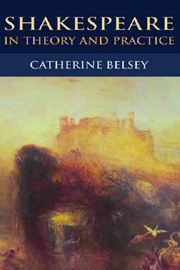Book contents
- Frontmatter
- Contents
- Preface
- 1 Introduction: Practising with Theory
- 2 Psychoanalysis and Early Modern Culture: Lacan with Augustine and Montaigne
- 3 Love as Trompe-l'oeil: Taxonomies of Desire in Venus and Adonis
- 4 Tarquin Dispossessed: Expropriation and Consent in The Rape of Lucrece
- 5 Antinomies of Desire and the Sonnets
- 6 Peter Quince's Ballad: Memory, Psychoanalysis, History and A Midsummer Night's Dream
- 7 The Illusion of Empire: Elizabethan Expansionism and Shakespeare's Second Tetralogy
- 8 Making Histories Then and Now: Shakespeare from Richard II to Henry V
- 9 The Case of Hamlet's Conscience
- 10 Iago the Essayist
- Notes
- Index
6 - Peter Quince's Ballad: Memory, Psychoanalysis, History and A Midsummer Night's Dream
Published online by Cambridge University Press: 12 September 2012
- Frontmatter
- Contents
- Preface
- 1 Introduction: Practising with Theory
- 2 Psychoanalysis and Early Modern Culture: Lacan with Augustine and Montaigne
- 3 Love as Trompe-l'oeil: Taxonomies of Desire in Venus and Adonis
- 4 Tarquin Dispossessed: Expropriation and Consent in The Rape of Lucrece
- 5 Antinomies of Desire and the Sonnets
- 6 Peter Quince's Ballad: Memory, Psychoanalysis, History and A Midsummer Night's Dream
- 7 The Illusion of Empire: Elizabethan Expansionism and Shakespeare's Second Tetralogy
- 8 Making Histories Then and Now: Shakespeare from Richard II to Henry V
- 9 The Case of Hamlet's Conscience
- 10 Iago the Essayist
- Notes
- Index
Summary
When in A Midsummer Night's Dream Nick Bottom wakes from his night of passion with the Queen of the Fairies, he seeks a quotation that will do justice to what has happened, but the weaver has difficulty in remembering the passage accurately. His reinscription of the biblical original has its own value in the context, however. ‘The eye of man hath not heard, the ear of man hath not seen, man's hand is not able to taste, his tongue to conceive, nor his heart to report, what my dream was’ (4.1.211-14).
Love is inevitably citational – but not necessarily less creative for that. In The Rose and the Ring, Thackeray's fairytale of 1854, the sadly unprepossessing, plump Prince Bulbo falls in love with Betsinda, and in this romantic condition Bulbo also looks for appropriate literary references. ‘ “I never saw” ’, he says, ‘ “a young gazelle to glad me with its dark blue eye that had eyes like thine. Thou nymph of beauty, take, take this young heart. A truer never did itself sustain within a soldier's waistcoat.” ’ The amorous prince here misquotes not only Shakespeare's Othello (5.2.260–1) but also the Irish poet Thomas Moore, whose gazelle had already provided considerable entertainment thirteen years earlier in The Old Curiosity Shop. Dickens's text in turn shows the verbose and villainous Dick Swiveller also misquoting Moore in the process of indicating his own unrequited passion for the perfidious Sophy Wackles:
‘It has always been the same with me,’ said Mr Swiveller, ‘always…. I never nursed a dear Gazelle, to glad me with its soft black eye, but when it came to know me well, and love me, it was sure to marry a market-gardener.’
- Type
- Chapter
- Information
- Shakespeare in Theory and Practice , pp. 94 - 108Publisher: Edinburgh University PressPrint publication year: 2008



